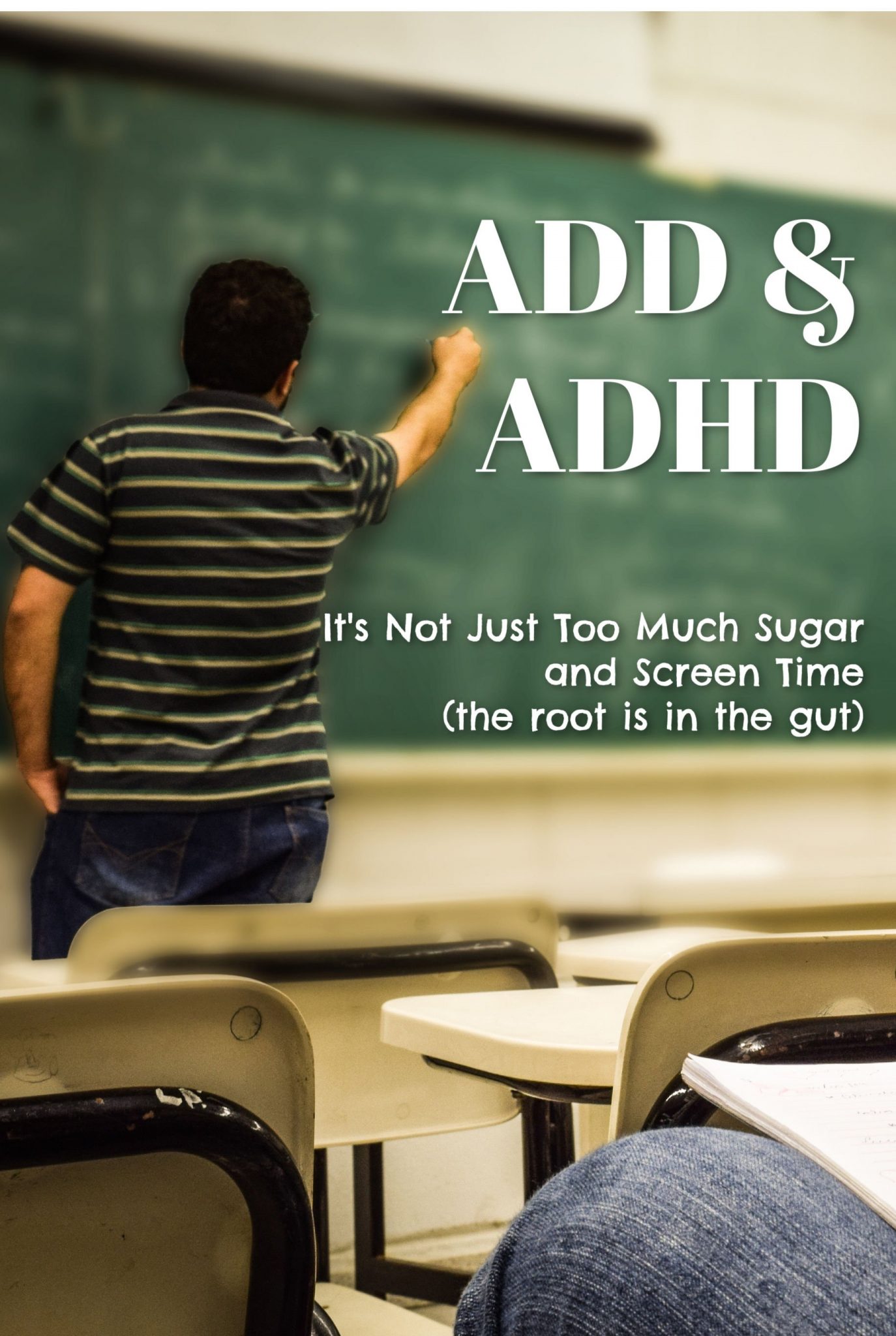 ADHD is one of the most polarizing health topics. Hyperactivity or inattention (ADD) have been blamed on too many electronics, lack of consistency in parenting, just boys being boys, too much structured time in the classroom, not enough structure at home, food additives, or just a normal part of childhood.
ADHD is one of the most polarizing health topics. Hyperactivity or inattention (ADD) have been blamed on too many electronics, lack of consistency in parenting, just boys being boys, too much structured time in the classroom, not enough structure at home, food additives, or just a normal part of childhood.
Brain Rewiring & Technology
With everything becoming increasingly ‘on demand’, there are more options for us to consider and sift through than ever before.
Studies have shown that frequent internet users can rewire how their brain processes information, which involves switching between topics more frequently and retaining less, in as little as 5 days (source).
This Time article explains, “Researchers in Canada surveyed 2,000 participants and studied the brain activity of 112 others using electroencephalograms (EEGs). Microsoft found that since the year 2000 (or about when the mobile revolution began) the average attention span dropped from 12 seconds to eight seconds.”
This isn’t necessarily a bad thing.
Consider shopping… When I was growing up, my parents left us with a sitter one evening before Christmas, hit the mall and Toys R Us, and hauled the shiny packages home in the back of their navy blue Jeep. A doll, a truck, a new outfit, and jewelry for Grandma. They chose between 4-5 options where today on Amazon we’re choosing between dozens and dozens of very similar products.
We need to be able to filter and select quickly.
Have you ever watched someone from the older generation online shop for a home appliance? It’s often an all-day event. Ads/clickbait are clicked on, every web page is read in its entirety, and a notebook or pad of paper often makes its appearance next to the computer to keep everything organized.
This isn’t a bad thing, but it’s also not something that we can generally sustain for every decision that we need to make, so we’ve adapted.
Those of us who have been using the internet for most of our adult lives probably have a nearly automatic selection process that looks something like this:
- Google ‘cordless vacuum reviews’
- Scan the first page of Google, automatically ignoring the ‘Ad’ listings at the top.
- Click on a review website that we’ve heard of before and we know not to be scammy.
- Scan the website and jump to the price range we’re looking for.
- See 2-3 vacuums in our price range that we want to compare prices for.
- Copy the model number, and paste that into Amazon, Overstock and maybe one other reputable website.
- Quickly scan those three websites for the three things we’re looking for: Price, shipping speed, and warranty/returns process.
- Choose the best for our needs, and complete checkout.
Though I wrote that in 8 steps, there were about 3-5 different ‘changes in attention’ for each of those steps. Is this ADD? Is this causing ADD? or has our brain adapted to efficiently use technology?
I would argue that this is a functional change that we’ve conditioned our brain to do. After all, we probably completed these steps in less time than I would take to drive to one store and look at one vacuum model, and we’ll probably have found a better value as well.
So is ADD a natural thing?
No. A disorder is characterized by something that impacts your quality of life in a negative way, to the point that it interferes with your daily activities.
It is useful for us to scan a dozen Amazon listings for a similar toy and pick out the lowest price/highest rating item in under 30 seconds. But similarly, it is NOT useful for us to not complete a needed task (like schoolwork, or organizing our belongings so that we can find them easily) because we can’t concentrate long enough to get it done.
Is there more to the rise of ADD and ADHD than just more technology being used in the house and less outside time? Yes.
But a missing piece, and likely a large part of the root issue, is the gut-brain connection.
When the body is healthy, we self regulate well
When we’re healthy we can self regulate. If we’re overstimulated, or antsy, or have watched too much TV, a healthy body will crave the opposite – a walk in nature, the TV turned off, or a book rather than checking Facebook for the 925th time that day.
Just as a healthy person tends to choose healthy foods, a healthy person will also choose to limit media consumption, and to get energy out in healthy ways.
This is why some people are so adamantly pro-self-regulation with media, and why others insist that their children need strict structure when it comes to media. My children fall on the side of needing more structure, I personally don’t have a problem leaving my smartphone in my purse, but I do turn the wifi off if I notice I’m using the email/facebook/pinterest/email loop to procrastinate writing, much like I would have moved from the kitchen to my bedroom while doing homework in elementary school.
Being able to self regulate, concentrate in the middle of distractions, and have impulse control is the sign of a well-functioning body and mind.
It’s not just genetics, the mind-body and even gut-brain connection plays a huge part. Yes, I’m saying that your DIGESTION affects your IMPULSE CONTROL.
What is ADHD?
ADHD is characterized by inability to focus, hyperactivity, impulse control issues and inattention. Children with ADD or ADHD often have trouble with schoolwork, with behavior in the classroom, getting long with other children, and paying attention to instruction.
ADHD does not always present with the classic hyperactivity, but rather some children may appear calm on the outside but not be able to pay attention to what’s being said during instructions.
Scientists are not sure what the cause of ADHD is, though studies including twins may show a genetic component.
(source)
What are the conventional treatments for ADHD?
Medications as treatment for ADD and ADHD are on the rise, being prescribed for children as young as age 3. Before automatically judging parents and doctors for prescribing children medication, realize that this is usually after lots of thought and behavioral programs. When children can’t attend to instruction, or control impulses, it affects their ability to learn.
I hope that by starting to understand the gut-brain-impulse connection, some of these children are able to come off medications, heal, and learn as they were designed to.
Medications are usually stimulants, such as:
- Adderal
- Concerta
- Focalin
- Ritalin
- Strattera
Side effects from stimulant medications like these include:
- Decreased appetite
- Sleep problems
- Tics
- Personality changes such as appearing ‘flat’ or without emotion
- Increased risk of strokes, cardiovascular problems in children already at risk
- Increased risk of psychiatric problems such as hallucinations in children already at risk
None of these treatments are thought to cure ADD or ADHD, but rather to just manage the symptoms.
Being on a medication with side effects like these should never be a long-term solution unless all other options have been exhausted.
Why is digestion and gut health so important?
Our gut, where we digest food, keep most of our immune system, and is even home to brain tissue, is much more important than most people realize.
The gut normally is populated with a hefty balance of good gut flora (microorganisms – yeasts, fungi, and bacteria). It normally is healthy tissue with intestinal villi that work with the gut flora to extract nutrients needed from food, and pass them through the gut wall into the blood stream. These villi move food along the digestive tract, break it into smaller pieces so that nutrients can be extracted, and secrete enzymes needed to break down food (source).
The bacteria in our gut line the gut walls, and actually pre-digest our food for us. They line our guts to prevent food from being passed through the gut walls without first being broken down sufficiently. This gut flora is also a large part of our immune system.
When our gut is unhealthy, the flora in our gut is not protecting food from being passed through, vitamins and minerals are not able to be extracted properly from food, the body is unable to detoxify normally, and the immune system is not functioning as it should.
Lastly, the pathogenic bacteria, which aren’t kept in check by the good bacteria, send out chemical signals as part of their metabolic process through the gut wall, into the bloodstream, and then make it to the brain.
This combination of chemical signals making their way to the brain from pathogenic bacteria and lack of nutrients being adequately absorbed in the gut are a horrible combination for a developing brain.
The ‘side effects’ of a gut healing diet?
This is what I’ve seen – these ‘good side effects’ show me that rather than further harming my body in attempt to solve one problem,we’re actually bringing everything into a balance, and the body is functioning like it should.
- Eliminating picky eating
- Food allergies eliminated
- Seasonal allergies lessened
- Better sleep
- Better growth
“All disease begins in the gut.” – Hippocrates
Other places that a gut-healing diet has seen to help ADHD:
- Robb Wolf: ADHD: Not a Ritalin Deficiency
- The Paleo Mama: What is Causing the Rise in ADHD?
- Evolutionary Psychiatry: Food Elimination and ADHD
- Study: Gluten free diet, Celiac, and ADHD
How to start balancing the gut to calm ADHD
First, I would look at sensory solutions to some of the behavior and impulse problems. Can sitting on an exercise ball help this child to focus? How about running laps rather than being put in time out for impulse issues? See more about sensory issues here – this is a non-medication tool that can help focus and calm children starting immediately, while we work to clean up the gut.
Next, we need to make healthy changes to our homes and reduce our toxic load – these are pretty basic steps but can make a big difference. Click here to get a free printable checklist for a 30-day plan to get this started in simple steps
Third, we try an elimination diet. It’s so common that removing foods that often are allergy-causing, inflammation-causing, and cause a leaky gut.
Elimination Diet & Balancing Gut Flora
Removing dairy and/or gluten will most often relieve symptoms drastically. And then we can work our way back to really healing our gut with the GAPS diet. (click here for more information on working backwards to the GAPS diet)
Then once we are stabilized and eliminating common allergens from our diet, we can work on restoring gut flora balance and healing the gut. Most importantly, we clean up the gut. (click here for the GAPS intro diet for gut healing and sealing)
Probiotics can help, be sure to go slow – we’ll be introducing these beneficial bacteria, which will in turn kill off the bad ones – when this happens we can experience a rush of symptoms, so it’s important to go slowly (these are the probiotics that I use)
When the gut flora is balanced, we should crave healthy food, have a stable mood, and feel nourished.
Depending on your symptoms, you may be able to modify this protocol and still see great results; possibly just removing gluten, any known allergens (often eggs, wheat, or dairy), and increasing probiotics for a time.
How did this work for us?
While we haven’t specifically had ADD or ADHD, my daughter used to be on the autism spectrum and struggled with attention and impulsiveness (and still does to some extent). Some people think that ADD and ADHD both fall on the very mild end of the autism spectrum, and I tend to agree with them.
When we are taking care of the gut by removing inflammatory foods and adding probiotics back in, I do notice a huge issue in her impulse control. When we deal with die off, from too many of the pathogenic bacteria being killed at once (see more about die off here), I tend to see the impulsivity come start to come back.
This is always an indicator to me that something if off in her diet or sensory-wise, whether we need to be taking probiotics slower, do more detox baths, or make sure we’re getting enough fresh air.
My son, I do believe that he has normal little-boy energy and I don’t notice a difference with this when he’s on the GAPS diet or not. He has the ability to pay attention in the classroom, but also craves lots of outside time, challenges like climbing, and other behaviors that some might think are ADD-like but I believe are developmentally appropriate.
I share this just to let you know that a dietary change will not automatically make your child eager to sit still and read books for hours at a time – some children naturally are like that, some children need more activity to grow and develop, this is all within the range of normal.
GAPS and Calmness
The GAPS diet isn’t like a tranquilizer or a pill that numbs your energy or mind, but rather it gives you back normal consistent calm energy. For young boys this variety or normal may be different than what our culture would prefer.
It’s really amazing to me to see the difference that a dietary change can make – many families find the calmness and quality of life achieved by dietary changes to be worth the initial lifestyle change.
And the health habits are a life long gift that we give our children.
Related posts:
How to make gut-healing broth cubes
There’s a War in Your Gut! (explain the microbe-mood connection to kids)
Why Sensory Integration May Be Causing Your Child’s Meltdowns
30+ Sensory-Friendly Holiday Gift Ideas for Children
More posts in this series:
Behavioral Problems? Skin Conditions? Low Immune System? It’s What We’re Feeding Them!
Eczema: Is the Root Cause in the Gut?

Learn how to heal leaky gut

60-page ebook of all my best GAPS Diet (Gut and Psychology Syndrome) articles all in one place.



If you don’t want to do full-on GAPS for ADHD, first try the Feingold Diet (feingold.org). It’s a little bit hard to believe the testimonials on the website, but I assure you, they’re true. We started the diet when our oldest was 4 and saw such improvements we’ve stuck with it (he’ll be 9 next month, and his younger brother has grown up never knowing “artificials”, as he calls them). We’ve never tried GAPS, but we did do GF/CF and found that we had no issues. Feingold though, made all the difference. One thing to note: it’s very important to follow the elimination diet properly and eliminate the fruits and vegetables (and spices and tea and coffee) as listed for the first 6 weeks: many people don’t think they react to such healthy foods as apples, peaches, berries, tomatoes and peppers. However, when they reintroduce some of these foods, they find that indeed, they can be as big a problem as the artificial colours, flavours, and preservatives. We’re lucky: we have to stay clear of artificials but can have all fruit and veg. One of the worst things for our son is BHT, which is used to preserve oils, and often isn’t on the label, so I’m constantly calling food companies to see if they can even trace that ingredient in their product. You may need GAPS, but you may find that Feingold is enough for you.
My son has been diagnosed with ADHD and we found an allergy to Yellow #5 triggered the hyperactivity. By eliminating this one thing and going towards a real food diet, we saw huge improvements. I do believe there is a gut brain connection as evidenced by the recent research. I also wonder if sodium benzoate causes problems. In the studies with the dyes, the researchers were not able to determine if it was the dyes, preservatives or a combination of both.
I think another issue is that educators now days forget that little boys have lots of energy and need time to run it off as you stated.
Glad you found something that worked for him :)
I think that there is a lot of pressure on educators now as well! My kindergartner reads as well as I did in 2nd grade, and I wasn’t considered behind or anything – they seem to cram a lot into even kinder now.